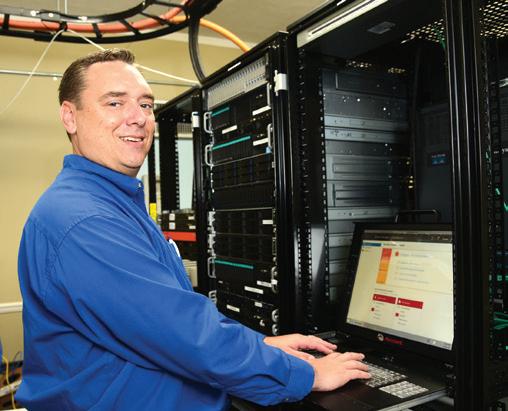
5 minute read
Innovation and Technology
LOCAL TECH FIRMS LOOK FORWARD TO 2021
INNOVATION & TECHNOLOGY
Advertisement
For companies facing the unprecedented challenge of conducting business during the COVID-19 pandemic, necessity has been the mother of innovation.
Leaders in internet technology firms in the Albany Area say no one has a crystal ball capable of peering into 2021 and—hopefully—a post-COVID world, but an increasing reliance on technological solutions will be critical to businesses’ success.
“As Americans, we’re having to adapt to this new way of doing business,” observed Kyle Boyd, CEO and owner of Crown Networking Consultants. “We don’t have all the kinks worked out, but I think we’re carving a path forward in this new era.”
That path has led to home for many workers, who found themselves unable to go to their offices after the shutdown in March. Remote working has been described as a paradigm shift for American business.
“The one thing we learned is that we can continue,” said Tammy McCrary, president and CEO of Comnet Technical Solutions (CTSI). “That’s a great thing about our country. We have been blessed and we can survive.”
A sharply different view of how work is done has evolved in just a few months. “I think the mentality of the workforce is changing,” Boyd said. “Over the past 60 years, you went to work and you went home. That’s definitely changing.
“It’s going to make technology push ahead a lot faster. As far as videoconferencing and the way we communicate and conduct business, it’s forever changed.”
McCrary noted many businesses have seen financial benefits from shifting work from the office to employees’ homes. “A lot of people are saying, ‘This is saving us money. We’re not having to pay for air conditioning and office space.’"
“In 2021, I see more people working from home," McCrary said. "I think you’re going to see more virtual training, more virtual meetings.”
Albany Area IT leaders say that working from home, virtual meetings and interaction, and an increasingly prominent role for technology will continue to trend upward. It helps that laptops, web cameras and other needed hardware that became scarce in the spring and summer when record demand collided with production interruptions is normalizing, though there are still some backorders. Businesses with good technology plans, training and strong IT support have managed the COVID pandemic better than others during this transformational period.
Tammy McCrary, president and CEO of Comnet Technical Solutions, notes that businesses are seeing financial benefits from having employees work from home.

Jay Carpenter, partner and business development director of Invision Technologies, said businesses “see the reliance on technology now.”
“The last five years, have you been able to work remotely? Most of our clients have,” Carpenter said. “But to be able to work as efficiently at the same speed with the data you’re pushing with the applications you’re running, I think this (COVID) has jumped us a couple of years forward, if not more. It hit the fast-forward button, no doubt.”
That has created benefits, such as more a more flexible schedule for the employee whose “office” has become the kitchen table, a “commute” of just a few steps from the family room. Challenges, however, also have arisen, including balancing work and family life, and learning COVID-era etiquette for participation in virtual business meetings.
Still, it’s premature to write the obituary of offices.
“I think we’ll see a shift back to the office,” said Rob Collins, founder and CEO of Neos Technologies. “Then, organizations will have to deal with any types of morale or culture issues. It’s hard to drive a company culture when every individual is in their home.
“But I also think there always will be that flexibility that next time this happens, they’ll be able to deploy back to home.”
Carpenter noted that “a lot of people learned about Zoom, remote phones and all these other remote things because they had to do it. Now that they’ve used it, they’re saying, ‘This is kind of nice.’ But I think the human interaction factor will always be there.”
A critical concern for businesses will continue to be cybersecurity.
“One of the biggest concerns for us as well as our clients when all this started was security, making sure that people understood the challenges they would see and have,” McCrary said.
“It’s been a really huge focus for us as well as our clients to make sure the technology they’re using is secure. There’s so much malice out there trying to steal information.”
Businesses generally have done a good job of securing their on-location networks, Collins said. Dark web and questionable websites are blocked by business network security. "A security problem," he said, "can stem from

Jay Carpenter, partner and business development director of Invision Technologies, thinks that COVID-19 has hit the fast forward button on technology.

Kyle Boyd, CEO & owner of Crown Networking, says the mentality of the workforce is changing.
something as seemingly innocuous as a child playing a video game like 'Fortnite' and downloading a program—one that turns out to be malicious."
“Take your corporate device home with you and you’re on your Internet and you don’t have those (security measures) in place,” Collins said. “Organizations are moving to implement tools and technologies that will follow that laptop so that network is just as secure from the home as it was from the office.”

A major concern in Southwest Georgia is access to fast, reliable Internet service. Albany has a strong fiber infrastructure, but not all rural communities do.
“The biggest thing we saw was just the hunger for bandwidth. ‘I need to increase this. It’s too slow,’” Carpenter said. “I relate bandwidth and networks to the plumbing in your house. People suddenly weren’t using little spigots in the kitchen. They were installing fire hydrants because they needed that bandwidth.”
“I know the governor’s got committees and initiatives they’re working on,” McCrary said. “I think in 2021, you’re going to see a lot more focus on making sure we’ve got secure, high-speed Internet to all the areas in rural Georgia. That needs to be a priority.”
As disruptive as COVID has been to them, businesses have been fortunate that technology is advanced enough so that coping is possible.
“Our technology let us fare a lot better than if this had happened even five years ago,” Boyd said. “That would have been a royal mess.”








